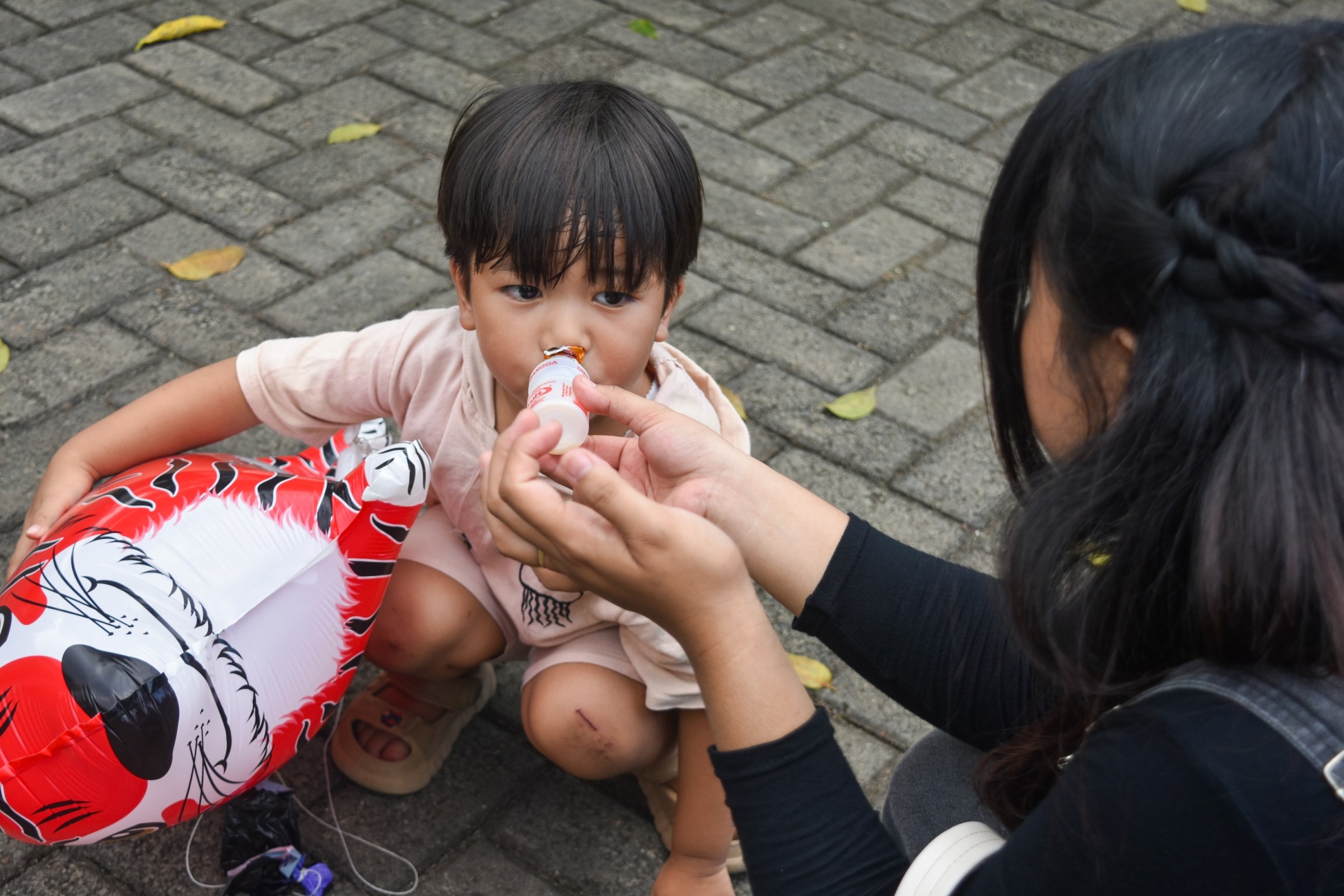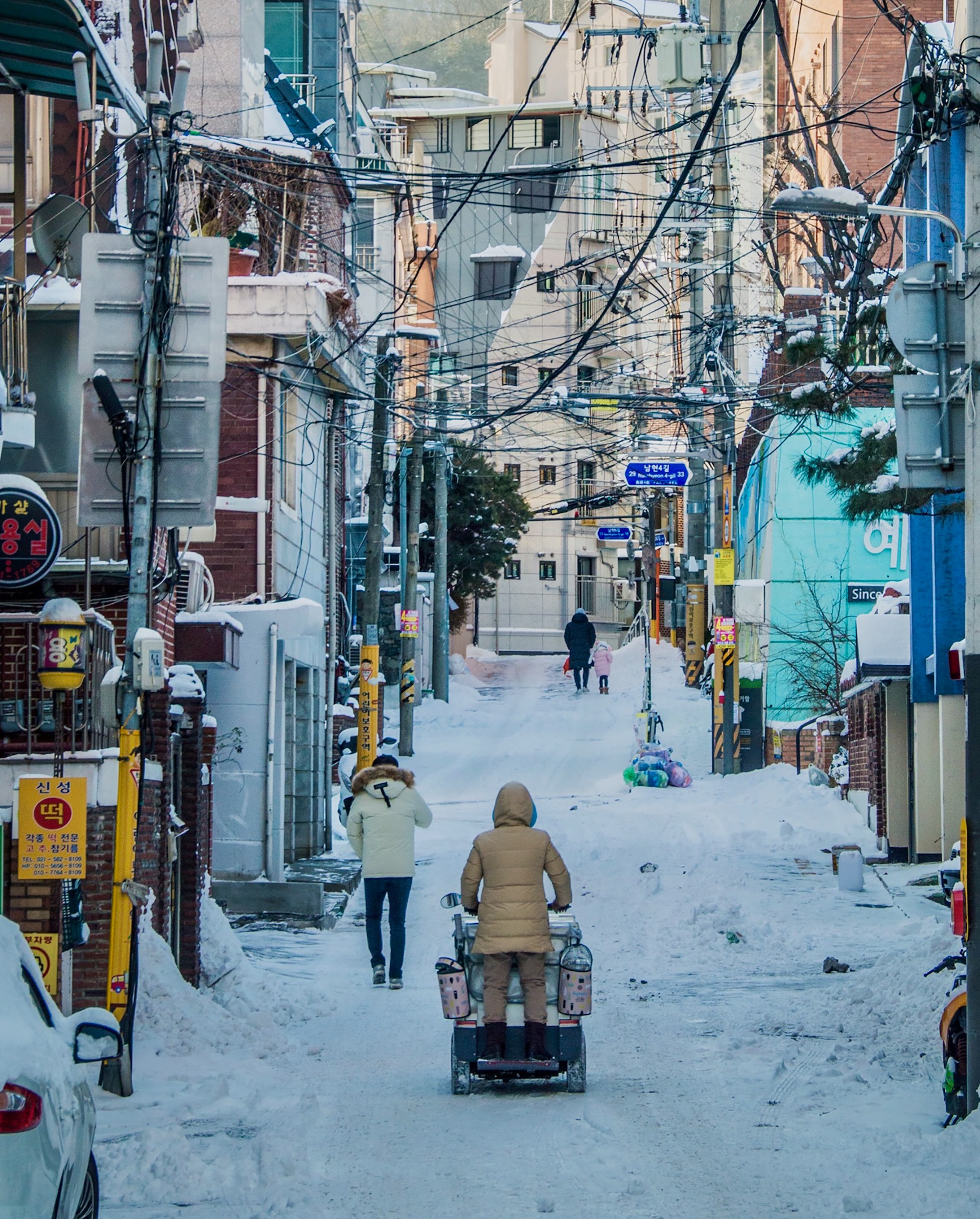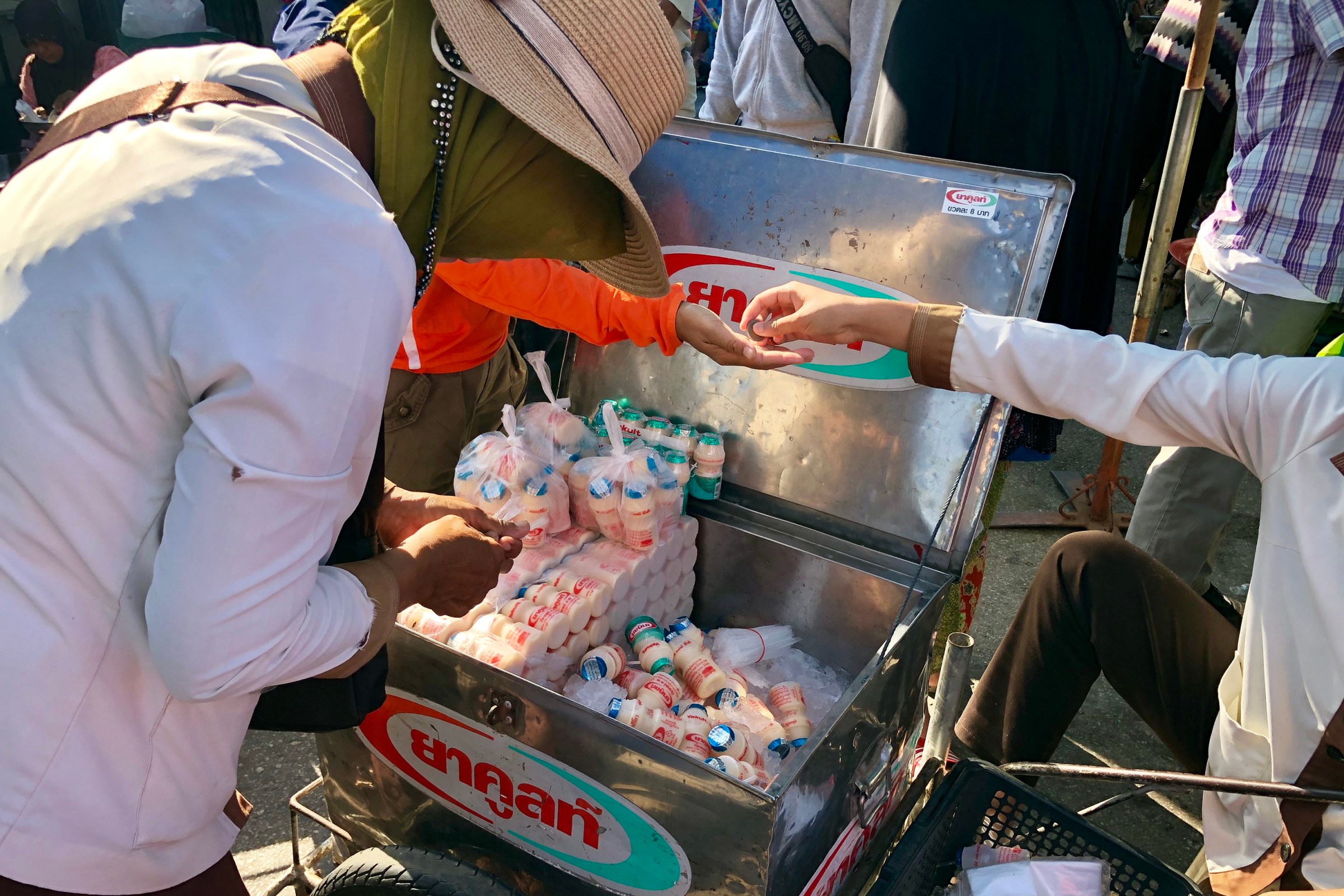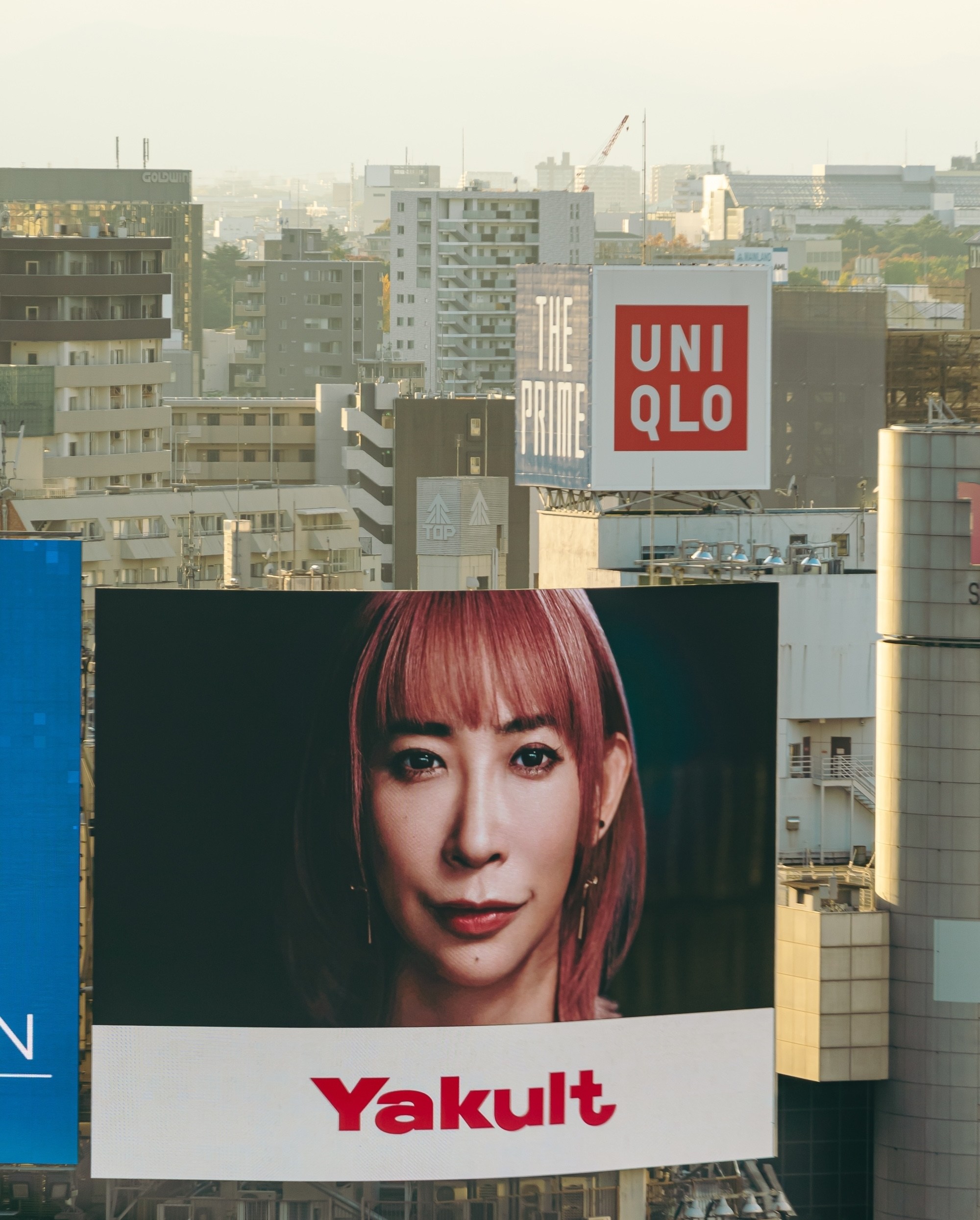When my sister and I were growing up in Nagoya, Japan, our mother would sometimes bring us to Tsuruma Park after school to let us run free. The playground, fringed by dark trees that cast shade on the Showa-era slides, always felt a little hidden, a separate place where only mothers and children could go.
But then, breaking through the unspoken barrier, there she would be: the Yakult lady, sailing toward us on her bicycle with a cool-blue cooler box mounted on the back. A discernible excitement would descend over the crowd of kids as we rushed like hungry pigeons to her feet, waiting for our turn to buy the sweet yogurt drinks she pulled from the cooler.
There was no waste in her movements: a neat twist of the waist, a flip of the latch. My mother would press a few coins into the woman’s palm, and the Yakult lady would hand us our bottles. Her bicycle, her bonnet, the drink’s sweet tang — all seemed to be indicators that the world around me was safe and sensible. But I also remember feeling briefly confused in that moment, as the Yakult lady delivered this essential bit of maternal care. Who was taking care of us: our mother or the Yakult lady? But the moment would pass, and the next child would step up for their turn.
If you live in a major U.S. city, you’ve likely seen Yakult in your supermarket. The telltale squat bottle with a shiny aluminum cap is stocked in my local grocery store in Chicago next to tofu and other refrigerated Asian goods. The company sells 30 million bottles per day across 40 countries. Or maybe you’d recognize the drink from the 2018 film To All the Boys I’ve Loved Before, when Lara Jean (Lana Condor) tells Peter Kavinsky (Noah Centineo) about the “Korean yogurt smoothie” she’s drinking. (That tiny mention is thought to have increased the company’s shares by 2.8 percent that year.)
Dr. Minoru Shirota invented the sweet, milk-based probiotic at Kyoto University in 1931. Formulated from Dr. Shirota’s own strain of lactobacillus — a strain of Lacticaseibacillus casei called Shirota — the drink was designed to promote a healthy digestive tract, quality sleep, and immunity. Today, that halo of health still surrounds the brand. My sister works in a Chicago hospital where a doctor sponsored by Yakult researches the benefits of lactobacillus on immune health. Influencers push it on followers as a health supplement for their families.
While the majority of Yakult is sold in stores, the company employs thousands of Yakult ladies to sell bottles in person. As of 2024, there were about 32,000 Yakult ladies operating in Japan, and another 50,000 outside of the country, mostly in China, South Asia, Brazil, and Mexico (where the uniforms can differ from the iconic blue color scheme in Japan). They deliver their wares on foot, bicycle, and motorcycle. With powder blue visors and matching pantsuits, they cut recognizable figures wherever they make their rounds.

A young mother in Indonesia helps her kid to a Yakult. Arnik Pratama/Shutterstock
Kazuhiro Noguchi, a Yakult franchise owner in Hiroshima, first introduced the delivery women in the mid-’50s. Believing it was easier for a housewife to enter a fellow housewife’s kitchen than for a salesman to get in the front door, he created a job for working women that fit with midcentury gender expectations.
“Especially for women with young children, this type of thing — where they could work while the children were at school — was a very attractive job because it allowed the household sphere to still hold their attention,” says Hilary Holbrow, a sociologist at Indiana University who specializes in labor and gender in Japan. The Yakult lady proved to be a success, and by 1963, she became formalized as a company-wide sales system. Today, Yakult still tries to attract working mothers with flexible schedules and on-site day care facilities.
Before having children, I assumed I would be the kind of mother who would race back to the office. When I got pregnant, I remember looking at my maternity leave — nearly four months, generous by American standards and paltry by the rest of the world — and feeling like that seemed like a long time to be alone with a baby. As someone who measured her worth through report cards and performance reviews, I felt uneasy with parenthood.
But when I had the baby, the creature I expected to feel like a distraction instead reframed my life. I didn’t want to rush back to the office. I wasn’t bored. She crystallized for me what mattered in my life, why I worked, who I wanted to provide for. I could never resent her. Instead I became resentful that I had to choose between being a working mother who histrionically complains about her children or being a devoted mother who abandons work and throws herself into caregiving. What I wanted — a working environment that would understand my temporary priority shift from career to motherhood, without negating my future ambition or need to earn money for my household — did not exist.
Though I’m not a 1950s housewife trying to make ends meet, I can sense the attraction of Yakult’s job offer from here, nearly eight decades away. The idea that employment would be tailor-made for a mother who works, constructed with her unique needs in mind, is a heady, tantalizing thing.
To understand the day-to-day routines of these women, I set out to interview them. But, like Mordor, it turns out one does not simply walk into Yakult. To date, the company has turned down two years’ worth of interview requests. Anytime I’ve approached Yakult ladies across Japan, they’re too busy or reluctant to talk. Eventually I secured one interview the only way I knew how: I walked into the Osu Kannon Yakult Center in Nagoya with my then-6-month-old daughter strapped to my chest.
The center was humming when I walked in, as Yakult ladies filled out delivery reports and packed their coolers with ice. But my daughter’s chubby cooing caught their attention, eventually distracting enough employees to draw a manager, who declined to share her name but agreed to speak.

A Yakult lady rides an electric scooter in snowy Seoul. Craig Lynch
“Most Yakult ladies start their shifts around 8:30 a.m. and finish by 1 p.m., unless they work a full-time shift, in which case they work till 5,” she told me. Yakult ladies bike everywhere, cycling around town for hours, sometimes going out of their way to make a single delivery. Though most Yakult ladies deliver to private homes, the team at the Osu Kannon center have corporate routes, meaning they’re dipping in and out of office buildings to hand off drinks to clients. They’re also supposed to stop and chat with anyone who strikes up a conversation on the street.
Yakult ladies aren’t classified as full-time employees, but kojin jigyo usha (roughly “sole proprietors”), essentially making them owners of bicycle-sized franchises. They purchase product from Yakult and make a profit based on what they can sell. Yakult says the average earnings of a Yakult lady are roughly $682 USD a month, compared to an average of $1,774 per month for Japanese women broadly. In Yahoo Answers forums, Yakult ladies claim wildly different profits: Some say they work only three hours a day and make more than the company average. Others claim to work far more, selling roughly $2,700 worth of product in a month to take home about $600, roughly a 22 percent cut.
They may decide their own schedules, but Yakult ladies don’t have designated holidays or sick days. The company encourages them to manipulate their schedules to accommodate time off. Even with an electric bike, it can all take a physical toll, and the manager told me Yakult ladies need to “get creative” to make it work. That might not be worth it to some mothers.
“The relative appeal of these Yakult jobs — that very much fit into these older models of how people’s families and life were supposed to look — is drastically reduced compared to the past,” says Holbrow.
Company-sponsored day care may have been attractive to midcentury housewives, but today Japan heavily subsidizes national day care, and paid maternity leaves from other companies regularly stretch for a year or more. Holbrow adds, “Something like 30 percent of women are never married by age 50. So the number of women who are responsible for raising children or taking care of their husbands is a much smaller share than it was in the past.”
At the Yakult Center, many of the Yakult ladies seemed to be in their 60s, which tracks with national trends. Nearly a third of Japanese citizens are 65 and older, and the national fertility rate is at an all-time low. The women working at the Osu Kannon center may have been some of the same women I saw delivering drinks when I was a kid. I didn’t see new mothers — mothers who look like me — among their ranks.
Still, Yakult positions its delivery workers more as mothers than salespeople. “We don’t do sales because everyone knows what Yakult is,” the manager told me. “The price hasn’t changed in years, so we don’t negotiate.” Instead, Yakult ladies are mijika na sonzai, roughly “known entities,” implying they’re not only familiar to their customers but close to them.

Ninekrai/Shutterstock
There are several company-approved “Day in the Life of a Yakult Lady” videos online, which feature the many different community members the women deliver to. A promotional video made by Yakult UK & Ireland provides a glossy, almost Yasujirō Ozu-esque fantasy of the Yakult lady’s function as a key part of a community’s social life. In recent years, the company has formalized this reputation into the “Ai no Houmon” (Love’s Visit) program, wherein Yakult ladies do what are essentially wellness checks on older adults while selling them probiotic beverages.
As I left the Yakult center, my baby clamoring for her nap, I felt oddly disillusioned — not by the women themselves, or even the no-nonsense manager, but by the corporate trappings of their work. Before I looked into it, I had swallowed the lighthearted, easy glow of Yakult’s promotional videos, which recalled my own experience when I was a kid. I would like to believe selling probiotic milk drinks is just an aside to Yakult ladies’ main mission of maternal care in the community. In the fluorescent lighting of the Yakult center, I saw their labor.
As a mother, I know creating a sense of comfort and safety requires constant work. To engender trust and calm through food, through milk specifically — in my case, produced by my own body — these are tasks that might seem effortless on the surface but in fact require effort and intention. The glassy, undisturbed surface Yakult ladies project is hard-won after hours each day spent on a bicycle loaded with drinks and selling a product hand-to-hand for little overhead.
Even more than drinks, the image of the unflappable Yakult lady is the product that the company sells; it’s also a product formed in a different Japan and inflected by 70 years of inequity. Like many working mothers, the Yakult lady today hides a complex network of compromises and conundrums.

An ad for Yakult in Shibuya City, Tokyo. Wueelongsupply/Shutterstock
The day after going to the Yakult Center I walked through a residential neighborhood. In the hushed, respectable quiet, it felt as if the rules of the 1950s still applied. The salarymen straightened their ties and boarded their packed subways. The children donned their bright yellow hats on their way to school. Laundry hung in neat, productive rows from crisply snapped laundry lines.
Through an open window, I heard the satisfying, high-pitched whine of a vacuum cleaner. I imagined the woman behind the machine: Is she a working mother squeezing in a chore before heading to the office? Is she a stay-at-home mother, busy at the unpaid, unseen work of running her house? Is she doing what I do, running the vacuum in nonsensical circles, hoping the drone of the machine will put her fussing infant to sleep so that she might steal 10 minutes of work?
Then, disturbing the stillness, I saw the one I was looking for. She swam down the empty street on her telltale bicycle, mounted with its light-teal refrigerated boxes. She wore a face mask, businesslike and hygienic. She neared the door of someone’s home, slowed, dismounted. After checking a clipboard, she pulled out two packs of Yakult, squat little bottles in clear plastic. She rang the doorbell, called out in a friendly, knowing way to the voice that answered, and made her delivery. Then she checked her clipboard, mounted her bike, and pushed off the asphalt with one, industrious kick of her heeled foot. As she sailed off, I felt like I was seeing a familiar ghost. There she goes, off on her next delivery: the Yakult lady.


AloJapan.com